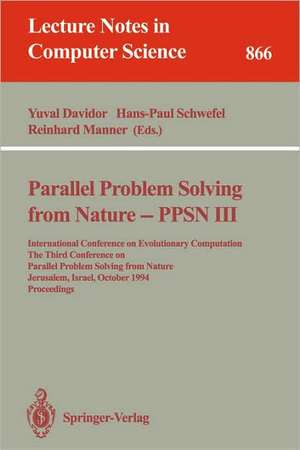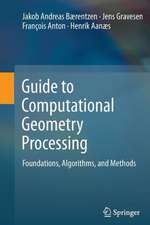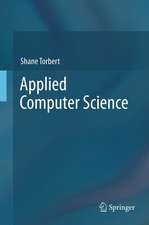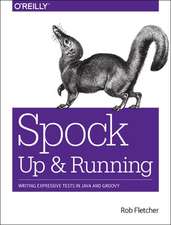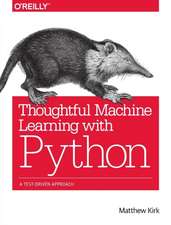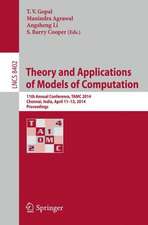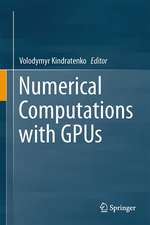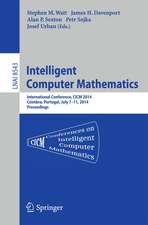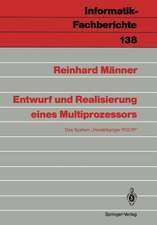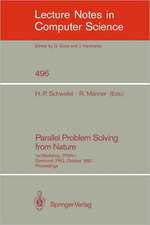Parallel Problem Solving from Nature - PPSN III: International Conference on Evolutionary Computation. The Third Conference on Parallel Problem Solving from Nature, Jerusalem, Israel, October 9 - 14, 1994. Proceedings: Lecture Notes in Computer Science, cartea 866
Editat de Yuval Davidor, Hans-Paul Schwefel, Reinhard Männeren Limba Engleză Paperback – 21 sep 1994
With the appearance of more and more powerful computers, there is increased interest in algorithms relying upon analogies to natural processes. This book presents a wealth of new theoretical and experimental results on artificial problem solving by applying evolutionary computation metaphors, including evolution strategies, evolutionary programming, genetic algorithms, genetic programming, and classifier systems. Topics such as simulated annealing, immune networks, neural networks, fuzzy systems, and complex, real-world optimization problems are also treated.
Din seria Lecture Notes in Computer Science
- 20%
 Preț: 1061.55 lei
Preț: 1061.55 lei - 20%
 Preț: 307.71 lei
Preț: 307.71 lei - 20%
 Preț: 438.69 lei
Preț: 438.69 lei - 20%
 Preț: 579.30 lei
Preț: 579.30 lei -
 Preț: 410.88 lei
Preț: 410.88 lei - 17%
 Preț: 427.22 lei
Preț: 427.22 lei - 20%
 Preț: 596.46 lei
Preț: 596.46 lei - 15%
 Preț: 448.04 lei
Preț: 448.04 lei - 20%
 Preț: 353.50 lei
Preț: 353.50 lei -
 Preț: 389.48 lei
Preț: 389.48 lei - 20%
 Preț: 309.90 lei
Preț: 309.90 lei - 20%
 Preț: 645.28 lei
Preț: 645.28 lei - 20%
 Preț: 763.23 lei
Preț: 763.23 lei - 15%
 Preț: 580.46 lei
Preț: 580.46 lei - 20%
 Preț: 310.26 lei
Preț: 310.26 lei - 20%
 Preț: 655.02 lei
Preț: 655.02 lei - 20%
 Preț: 1183.14 lei
Preț: 1183.14 lei - 20%
 Preț: 340.32 lei
Preț: 340.32 lei -
 Preț: 449.57 lei
Preț: 449.57 lei - 20%
 Preț: 591.51 lei
Preț: 591.51 lei - 18%
 Preț: 938.83 lei
Preț: 938.83 lei - 20%
 Preț: 337.00 lei
Preț: 337.00 lei - 20%
 Preț: 649.49 lei
Preț: 649.49 lei - 20%
 Preț: 607.39 lei
Preț: 607.39 lei - 20%
 Preț: 1414.79 lei
Preț: 1414.79 lei - 20%
 Preț: 1024.44 lei
Preț: 1024.44 lei - 20%
 Preț: 583.40 lei
Preț: 583.40 lei - 20%
 Preț: 453.32 lei
Preț: 453.32 lei - 20%
 Preț: 575.48 lei
Preț: 575.48 lei - 20%
 Preț: 1075.26 lei
Preț: 1075.26 lei - 20%
 Preț: 585.88 lei
Preț: 585.88 lei - 20%
 Preț: 825.93 lei
Preț: 825.93 lei - 17%
 Preț: 360.19 lei
Preț: 360.19 lei - 20%
 Preț: 763.23 lei
Preț: 763.23 lei - 20%
 Preț: 340.32 lei
Preț: 340.32 lei - 20%
 Preț: 504.57 lei
Preț: 504.57 lei - 20%
 Preț: 369.12 lei
Preț: 369.12 lei - 20%
 Preț: 580.93 lei
Preț: 580.93 lei - 20%
 Preț: 343.62 lei
Preț: 343.62 lei - 20%
 Preț: 350.21 lei
Preț: 350.21 lei - 20%
 Preț: 583.40 lei
Preț: 583.40 lei - 20%
 Preț: 583.40 lei
Preț: 583.40 lei - 15%
 Preț: 438.59 lei
Preț: 438.59 lei - 20%
 Preț: 341.95 lei
Preț: 341.95 lei - 20%
 Preț: 238.01 lei
Preț: 238.01 lei - 20%
 Preț: 538.29 lei
Preț: 538.29 lei
Preț: 663.79 lei
Preț vechi: 829.73 lei
-20% Nou
Puncte Express: 996
Preț estimativ în valută:
127.01€ • 133.32$ • 105.42£
127.01€ • 133.32$ • 105.42£
Carte tipărită la comandă
Livrare economică 10-24 aprilie
Preluare comenzi: 021 569.72.76
Specificații
ISBN-13: 9783540584841
ISBN-10: 3540584846
Pagini: 664
Ilustrații: XVII, 647 p.
Dimensiuni: 155 x 233 x 35 mm
Greutate: 0.92 kg
Ediția:1994
Editura: Springer Berlin, Heidelberg
Colecția Springer
Seria Lecture Notes in Computer Science
Locul publicării:Berlin, Heidelberg, Germany
ISBN-10: 3540584846
Pagini: 664
Ilustrații: XVII, 647 p.
Dimensiuni: 155 x 233 x 35 mm
Greutate: 0.92 kg
Ediția:1994
Editura: Springer Berlin, Heidelberg
Colecția Springer
Seria Lecture Notes in Computer Science
Locul publicării:Berlin, Heidelberg, Germany
Public țintă
ResearchCuprins
Lamarckian evolution, the Baldwin effect and function optimization.- Control of parallel population dynamics by social-like behavior of GA-individuals.- Studying genotype-phenotype interactions: A model of the evolution of the cell regulation network.- A diploid genetic algorithm for preserving population diversity — Pseudo-Meiosis GA.- Co-evolutionary constraint satisfaction.- Towards a theory of ‘evolution strategies’: Results for (1 , + ?)-strategies on (nearly) arbitrary fitness functions.- Advanced correlation analysis of operators for the traveling salesman problem.- Genetic algorithms with multi-parent recombination.- On the mean convergence time of evolutionary algorithms without selection and mutation.- Estimating the heritability by decomposing the genetic variance.- Analyzing hyperplane synthesis in genetic algorithms using clustered schemata.- Convergence models of genetic algorithm selection schemes.- Optimal population size under constant computation cost.- An evolutionary algorithm for integer programming.- Long path problems.- Evolution strategies on noisy functions how to improve convergence properties.- Selection schemes with spatial isolation for genetic optimization.- A modified edge recombination operator for the Travelling Salesman Problem.- Step-size adaptation based on non-local use of selection information.- Strategy adaptation by competing subpopulations.- Controlling crossover through inductive learning.- Derivative operators for preference predicate evolution.- Adaptive crossover using automata.- Controlling dynamics of GA through filtered evaluation function.- A cooperative coevolutionary approach to function optimization.- A fuzzy classifier system using the Pittsburgh approach.- Q-learning in Evolutionary Rule Based Systems.- On thecomplexity of learning in classifier systems.- A representation scheme to perform program induction in a canonical genetic algorithm.- Genetic Programming with local hill-climbing.- Dynamic training subset selection for supervised learning in Genetic Programming.- Genotype-phenotype-mapping and neutral variation — A case study in Genetic Programming.- Genetic L-System Programming.- A genetic algorithm discovers particle-based computation in cellular automata.- Simulation of exaptive behaviour.- Artificial spacing patterns in a network of interacting celloids.- Diffuse pattern learning with Fuzzy ARTMAP and PASS.- Different learning algorithms for Neural Networks — A comparative study.- Program search with a hierarchical variable length representation: Genetic Programming, simulated annealing and hill climbing.- Problem-independent Parallel Simulated Annealing using selection and migration.- Parallel optimization of evolutionary algorithms.- Parallel simulated annealing and genetic algorithms: A space of hybrid methods.- ENZO-M — A hybrid approach for optimizing neural networks by evolution and learning.- Genetic lander: An experiment in accurate neuro-genetic control.- Effects of Occam's razor in evolving Sigma-Pi neural nets.- Designing neural networks by adaptively building blocks in cascades.- Hybrid adaptive heuristic critic architectures for learning in mazes with continuous search spaces.- Mutation operators for structure evolution of neural networks.- Implementation of standard genetic algorithm on MIMD machines.- Loosely coupled distributed genetic algorithms.- Applying Evolvable Hardware to autonomous agents.- Genetic Algorithms on LAN-message passing architectures using PVM: Application to the Routing problem.- Genetic algorithm based designoptimization of CMOS VLSI circuits.- Improving evolutionary timetabling with delta evaluation and directed mutation.- Genetic improvement of railway timetables.- Using a genetic algorithm to search for the representational bias of a collective reinforcement learner.- An evolutionary algorithm for the routing of multi-chip modules.- System design under uncertainty: Evolutionary optimization of the Gravity Probe-B spacecraft.- Soft selection in D-optimal designs.- The weighted graph bi-partitioning problem: A look at GA performance.- RPL2: A language and parallel framework for evolutionary computing.
